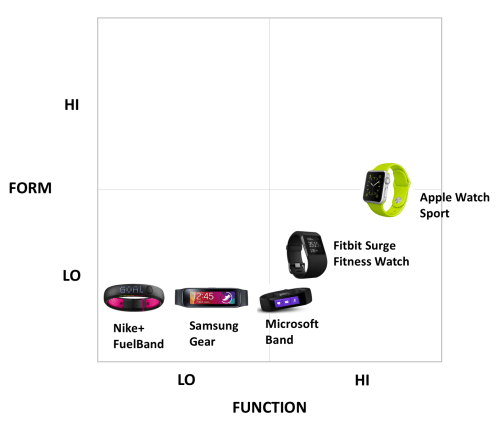What Job Do You Hire the Apple Watch For?
What Job Do You Hire the Apple Watch For?
After the recent Apple keynote, a friend sent me these questions:
1.Is the watch now a permanent part of your purchase? Buy one every 2 years to pair with your iPhone? 2.What would have to happen for you to say – it is not worth spending $350 to have a watch on my wrist? 3.Why buy a $350 Apple when a $100-$200 Pebble gives you the same functionality?
The question behind the question is, what is the compelling reason to buy a product.
1.Is the watch now a permanent part of your purchase? Buy one every 2 years to pair with your iPhone? 2.What would have to happen for you to say – it is not worth spending $350 to have a watch on my wrist? 3.Why buy a $350 Apple when a $100-$200 Pebble gives you the same functionality?
The question behind the question is, what is the compelling reason to buy a product.
JOBS TO BE DONE
Clayton Christensen popularized the jobs-to-be-done framework as a way to look at customer motivations. The logic being that people rarely behave like the “average” customer in their category might. People have problems they need solved, and “hire” a product or service to get the “job” done. Companies that understand this increase their chances of delivering products or services that are tailored to what customers are already trying to do.
So what job might we hire the Apple Watch to do for us? Leaving aside the fact that this product is called the Apple Watch, more broadly speaking, what job might we hire a “computer on our wrist” for? There are three main types of jobs:
Functional – what does the product do and how well does it do that?
Social – what will people think of me when they see me with this product?
Emotional – how do I feel when I have this product?
Functional jobs might be “tell time“, daily activity tracking such as “count my steps“, and so on. Given that most of these things can be done with an iPhone, one particular job that Apple thinks we might need to hire the watch for is “quickly access important information without having to pull out my iPhone“. This seems to stem from negative social perception from frequent use of the iPhone, e.g. what do people think of me when they see me pulling out my iPhone too many times to quickly access important information (granted that it is not always important information that people are using their iPhones for).
For social and emotional benefits of owning a product, in the past, the Apple faithful have lined up outside Apple stores to be the first to get a new product in their hands. Will they continue to do so for the Watch? We don’t know. However, it is safe to assume that there are always a small percentage of people who enjoy being seen as the flag bearers. Early adopters of the Google Glass on the other hand faced a backlash and were referred to as “glassholes“, perceived as being creepy or rude, whether they displayed that behavior or not. The Apple Watch Edition seems to be conjuring up similar perceptions that the $10,000 watch is “for people with too much money and too little sense“. We’ll come to that later. So what job do we hire the Apple Watch to do? That depends and there is no one answer.
So what job might we hire the Apple Watch to do for us? Leaving aside the fact that this product is called the Apple Watch, more broadly speaking, what job might we hire a “computer on our wrist” for? There are three main types of jobs:
Functional – what does the product do and how well does it do that?
Social – what will people think of me when they see me with this product?
Emotional – how do I feel when I have this product?
Functional jobs might be “tell time“, daily activity tracking such as “count my steps“, and so on. Given that most of these things can be done with an iPhone, one particular job that Apple thinks we might need to hire the watch for is “quickly access important information without having to pull out my iPhone“. This seems to stem from negative social perception from frequent use of the iPhone, e.g. what do people think of me when they see me pulling out my iPhone too many times to quickly access important information (granted that it is not always important information that people are using their iPhones for).
For social and emotional benefits of owning a product, in the past, the Apple faithful have lined up outside Apple stores to be the first to get a new product in their hands. Will they continue to do so for the Watch? We don’t know. However, it is safe to assume that there are always a small percentage of people who enjoy being seen as the flag bearers. Early adopters of the Google Glass on the other hand faced a backlash and were referred to as “glassholes“, perceived as being creepy or rude, whether they displayed that behavior or not. The Apple Watch Edition seems to be conjuring up similar perceptions that the $10,000 watch is “for people with too much money and too little sense“. We’ll come to that later. So what job do we hire the Apple Watch to do? That depends and there is no one answer.

KILLER APP
For the Blackberry and smartphones before the iPhone, the killer app was email. These smartphones were mostly popular within the business user segment, people who needed access to email on the go. That was the primary job the smartphones were hired for. When the iPhone came, it was successful in challenging the notion of email being the killer app. It offered the entire Internet in your pocket. You could access the entire Internet on the go. In that sense, the iPhone expanded the market for the smartphone category by appealing to business and non-business users alike, by successfully shifting the job that smartphones were hired for.
So what is the killer app for the Apple Watch?
Given Apple’s focus on health and the prominence given to Christy Turlington Burns and her use of the Watch to prepare for the London Marathon, we can see what job Apple believes people should hire the Watch for – personal health and fitness tracking.
If we compare the Apple Watch to fitness and activity trackers on the market, we get a different picture.
So, in summary
1.Consistent good decision-making and behavior that earns credibility and trust
2.Leadership and selflessness in the interest of the team
3.Confidence in one’s own abilities
4.All-round impact across the end to end product lifecycle
5.Strong work ethic and no-compromise attitude
6.Coachable and aligned with a higher vision
What do you think? Go ahead, be like Mike!
So what is the killer app for the Apple Watch?
Given Apple’s focus on health and the prominence given to Christy Turlington Burns and her use of the Watch to prepare for the London Marathon, we can see what job Apple believes people should hire the Watch for – personal health and fitness tracking.
If we compare the Apple Watch to fitness and activity trackers on the market, we get a different picture.
So, in summary
1.Consistent good decision-making and behavior that earns credibility and trust
2.Leadership and selflessness in the interest of the team
3.Confidence in one’s own abilities
4.All-round impact across the end to end product lifecycle
5.Strong work ethic and no-compromise attitude
6.Coachable and aligned with a higher vision
What do you think? Go ahead, be like Mike!

All of a sudden, the Apple Watch Sport at $350 does not seem to demand an unrealistic premium over the $250 Fitbit Surge.
It is really an activity tracker on steroids (ahem!) and looks and calls itself a watch only because of where it sits on your body. It seemed logical to design it as a watch and make it as desirable as possible, even as a luxury item, something that just a simple fitness tracker would not have the permission to become.
Plus, if you wanted something to make you look like you aren’t one of those people who constantly look at their iPhones, you could easily just glance at your watch. We don’t have social norms against that, just yet!
Thoughts?
It is really an activity tracker on steroids (ahem!) and looks and calls itself a watch only because of where it sits on your body. It seemed logical to design it as a watch and make it as desirable as possible, even as a luxury item, something that just a simple fitness tracker would not have the permission to become.
Plus, if you wanted something to make you look like you aren’t one of those people who constantly look at their iPhones, you could easily just glance at your watch. We don’t have social norms against that, just yet!
Thoughts?
Facebook
Twitter
LinkedIn
Trending Posts
Tagged blogs




